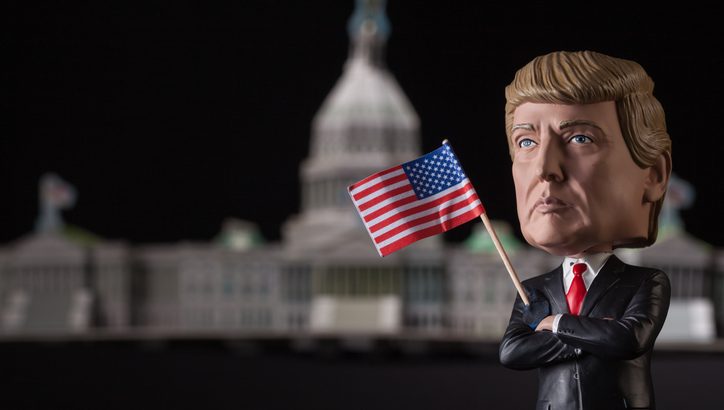Venezuela is on the verge of implosion. Inflation has skyrocketed, shortages of food and other basic necessities abound, and Venezuelans are increasingly fleeing the country and relocating around the region. “A country that was once the richest in Latin America is now a basket case, and the Bolivarians are to blame. The scope of their failure, with the world’s greatest reserves of oil, is just astounding,” says professor Patrick Duddy, a former ambassador to Venezuela.
Read More on The Cipher BriefCategory: Politics-Public Policy

How Health Care Reform Could Hurt Women
Proposed changes to the Affordable Care Act would remove requirements to cover maternity care and contraception. Those changes would hurt women especially hard, says Dr. Megan Huchko, an associate professor in the Department of Obstetrics and Gynecology and the Duke Global Health Institute.
Listen on Glad You Asked

Real Populism Was Very Different From Trump’s Pseudo-Populism Today
“For months, we’ve been told that Donald Trump’s election was a ‘populist revolt,’ working-class, alienated white Americans dissatisfied with the growing economic inequality rising up against a self-satisfied Establishment. There is some truth in this. But real populism — such as that in the 1880s and 1890s — was very different from Trump’s pseudo-populism,” writes historian emeritus William Chafe.
Read More in The Hill
Choosing Which Cable Channels To Provide Is Speech, But Offering Internet Access Is Not
“The Supreme Court has always required substantive communication or self-expression as a necessary condition for the application of the First Amendment. And simply charging more money, or providing faster speeds, is not a substantive communication,” writes law professor Stuart Benjamin.
Read More in The Washington Post
Fat Years And Lean Years — Don’t Be Too Enthusiastic About Tax Cuts
“In the Bible, Joseph told Pharaoh to save during the seven fat years to support society during the seven lean years. This story is worth remembering now that the Trump administration is proposing a new round of tax cuts in an effort to stimulate economic growth,” writes Dr. Kevin Schulman, a professor of medicine. “It is also worth remembering that this tax-cut approach was tried in the 1980s, and led to increases in the federal deficit.”
Read More in The Hill
An Increase in Women Legislators Is Linked to Fewer Infant Deaths
A study led by Patricia Homan, a doctoral candidate in sociology, finds that American states with higher percentages of women in their legislatures enjoy lower infant mortality rates. She found this relationship both when making state-to-state comparisons, and when looking at the same state’s statistics over the years. “These findings underscore the importance of women’s political representation for population health,” Homan writes in the journal Social Science and Medicine.
Read More in Pacific Standard
In 100 days, Donald Trump Hasn’t Done Much
“It’s show and tell,” historian emeritus William Chafe says of the president’s executive order signings. “It’s basically trying to create the impression of decisiveness.” In Chafe’s view, it’s actually a misimpression, given the lack of a single significant piece of legislation to pass under Trump’s watch, including the 10 he specifically promised he would shepherd through Congress in his first 100 days.
Read More in The Huffington Post

NAFTA and Global Value Chains
“A winning way to view the world is through the lens of regional value chains competing with each other. North America is competing with Europe and East Asia, rather than the U.S. competing with Germany and China,” writes Gary Gereffi, director of the Center on Globalization, Governance & Competitiveness at Duke. “The national approach is an outdated framework from the economic standpoint. Most industries today are organized into regional and global supply chains, which requires a new calculus of winners and losers involving both workers and companies.”
Read More at Brookings.com
Seven States May Provide a Window Into Taxes Under Trump
President Donald Trump and congressional Republicans are promising one of the biggest tax cuts since the days of Ronald Reagan, similar to what North Carolinians have already experienced through state legislation. The poor would be especially hard hit, critics contend. For example, a border adjustment tax “would be passed through to people based on what they consume,” says tax law professor Lawrence Zelenak.
Read More in USA Today
Political Opposites Try Listening To Each Other
Under the auspices of Duke University, 30 leaders met five times for all-day sessions featuring civil conversations about how to help more North Carolinians earn enough to support their families. Fritz Mayer, who headed the Duke project, called it a “fascinating exercise” and said Duke had funding to bring in another group of North Carolina leaders in the fall.
Read More in the Herald-Sun
Activists Try to Turn Anti-Trump Protests Toward Nine Companies
Liberal activists groups are hoping to turn the wave of anti-Trump outrage against nine corporations they say are enabling Trump’s agenda. “Whether we like it or not, everything is political now, including business,” says Aaron Chatterji, associate professor at The Fuqua School of Business. “We can leverage the way people interact with campaigns to the way they interact with companies.”
Read More in TIME
NC Republicans’ Latest Power Grab: State Judicial Appointments
The Republicans who control North Carolina’s legislature are attempting to strip the state’s Democratic governor of more powers, this time over who has the power to make appointments to the state’s courts. “This is a pretty significant push I think to undercut the independence of the judiciary,” says law professor Marin Levy.
Listen on NPR


